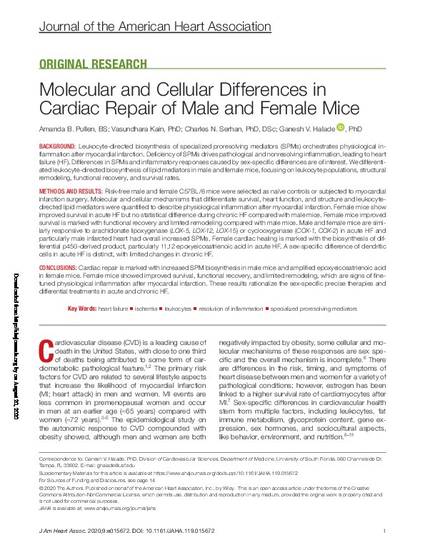
- heart failure,
- ischemia,
- leukocytes,
- resolution of inflammation,
- specialized proresolving mediators
Background Leukocyte-directed biosynthesis of specialized proresolving mediators (SPMs) orchestrates physiological inflammation after myocardial infarction. Deficiency of SPMs drives pathological and nonresolving inflammation, leading to heart failure (HF). Differences in SPMs and inflammatory responses caused by sex-specific differences are of interest. We differentiated leukocyte-directed biosynthesis of lipid mediators in male and female mice, focusing on leukocyte populations, structural remodeling, functional recovery, and survival rates. Methods and Results Risk-free male and female C57BL/6 mice were selected as naïve controls or subjected to myocardial infarction surgery. Molecular and cellular mechanisms that differentiate survival, heart function, and structure and leukocyte-directed lipid mediators were quantified to describe physiological inflammation after myocardial infarction. Female mice show improved survival in acute HF but no statistical difference during chronic HF compared with male mice. Female mice improved survival is marked with functional recovery and limited remodeling compared with male mice. Male and female mice are similarly responsive to arachidonate lipoxygenase (LOX-5, LOX-12, LOX-15) or cyclooxygenase (COX-1, COX-2) in acute HF and particularly male infarcted heart had overall increased SPMs. Female cardiac healing is marked with the biosynthesis of differential p450-derived product, particularly 11,12 epoxyeicosatrienoic acid in acute HF. A sex-specific difference of dendritic cells in acute HF is distinct, with limited changes in chronic HF. Conclusions Cardiac repair is marked with increased SPM biosynthesis in male mice and amplified epoxyeicosatrienoic acid in female mice. Female mice showed improved survival, functional recovery, and limited remodeling, which are signs of fine-tuned physiological inflammation after myocardial infarction. These results rationalize the sex-specific precise therapies and differential treatments in acute and chronic HF.
Journal of the American Heart Association, v. 9, issue 8, art. e015672
Available at: http://works.bepress.com/ganesh-halade/58/